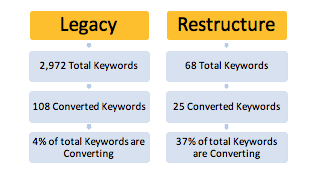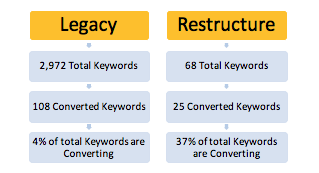![]() By Nathan Singer , July14, .2016
By Nathan Singer , July14, .2016
When receiving an account, many SEMs follow the old- school train of thought that you need to have as many keywords as possible. At the end of the day, though, size doesn’t always matter. The first thing you want to do is grow an account and expand the keyword set, but there are instances where actually downsizing a keyword set and focusing on top-performing proven keywords is the way to go. The first thing many clients want, after all, is efficient performance – not more keywords.
Below are three advantages to a smaller keyword set (drawn from a real-life account where a keyword set of 2,972 was outperformed by a keyword set of 68 in the tough, high-CPC industry of CRMs).
1. Data Makes the World Go Round
With a smaller set of proven keywords, you have more control and can in the long run gain more valuable data per keyword to make more statistically significant decisions. With a large set of keywords, you run a higher risk of data sparsity.
Example:

With the legacy structure, we have 96% of the Keyword set either bleeding the Campaign or not serving at all.
2. Simplicity is the Soul of Efficiency
With a smaller Keyword set, you obviously have a lot less to manage – which means you can be a lot more targeted from your query mapping all the way down to your ads.
Example:

We are seeing huge improvements in efficiency with more than double the click-through rate and a higher CVR, meaning we are bringing not only more users but more qualified users.
3. Be Aggressive, Be Be Aggressive
With this smaller set of keywords, you can be a lot more aggressive with your bids. This is especially advantageous when you are in a competitive industry with high CPCs.
Example:

One of our client’s key terms that targets their core audience is one of the most competitive keywords in the industry. We were able to create tailored ad copy and aggressively push bids, increasing the average position and CTR significantly and making it one of our top-performing Keywords.
By starting with a strong core set of keywords, you create a solid foundation for expansion. When receiving an account this might be obvious. However, to those who are currently on an account with campaigns with thousands of keywords and are afraid to start from scratch, that may not be the case. The main fear is that you are going to lose out on the history and the data of the current campaign with a restructure; in actuality, you are using that data to create a newer and better campaign. And this, by definition, is a data-driven decision.
(27)
Report Post







